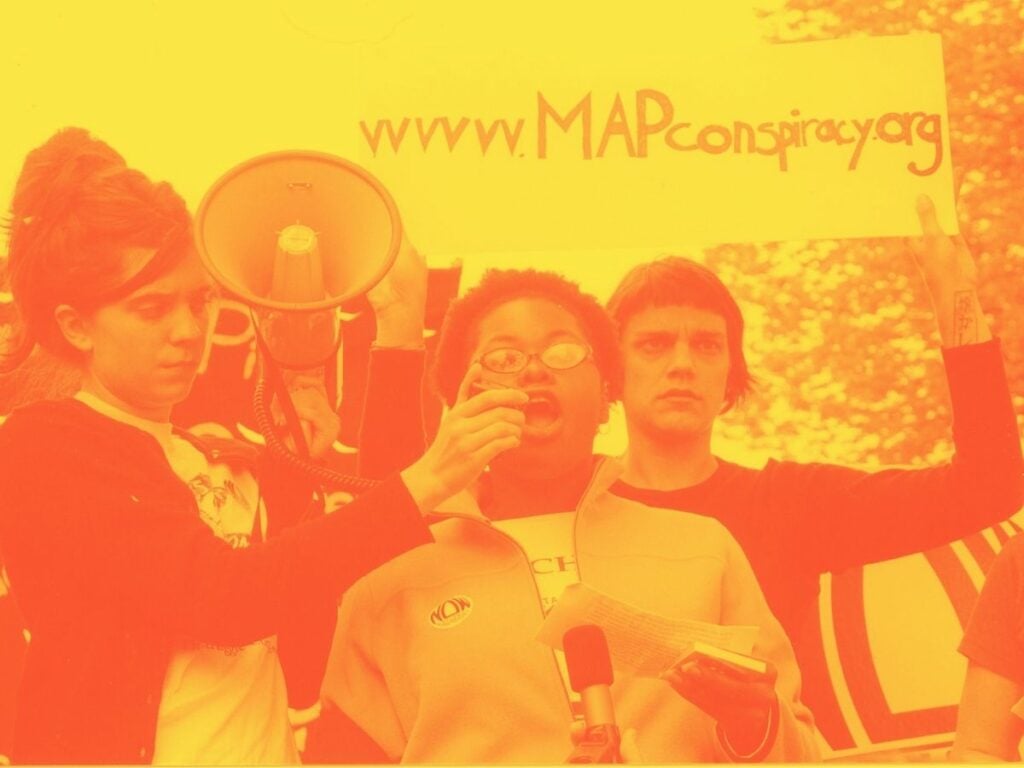You can read Part 1 of this article here.
National Women’s Liberation took a page from the birth control and abortion campaigners of the 1960s and ‘70s with our 2003 launch of a successful 10-year struggle to make the morning-after pill (after-sex contraception) available without a prescription. This medication is more effective the sooner after sex it is taken, which made the prescription requirement an obstacle to effective use. Calling ourselves the “Morning-After Pill Conspiracy,” we deliberately violated the law by passing out pills at demonstrations and giving them away as door prizes at fundraisers. Because NWL, and other groups that joined the Conspiracy, were all dues-funded, we didn’t have to worry whether this would hurt our reputation with foundations.
Our lawyers told us that violation of that prescription requirement in itself appeared to carry no threat of jail time, though we might face fines. As it turned out, there was no police or FDA enforcement response to our vigorous pill distribution and our public announcements that we were giving friends the morning-after pill. Possibly the authorities calculated that any publicity would help our cause.
Thousands of us publicly pledged to (illegally) “give a friend the morning-after pill.” We faxed 4,400 pledges to the Food and Drug Administration to show that the prescription requirement was not stopping us. Our pledge was a natural extension of what women were already doing or were willing to do for each other, once they knew it was possible. (Most ordinary packages of hormonal birth control can be made into a makeshift morning after pill.)
The pledge transformed our personal commitment into a political statement that could push the power structure. Our activities, including testifying at hearings and sitting in at the FDA, gave encouragement to FDA staffers who disagreed with the agency’s actions. In 2013, a judge ordered the FDA to put the morning-after pill over the counter for all ages with no ID requirement.
We were told from the outset by various nonprofits that we could never reach this goal and we should think smaller, asking for the pill for rape victims in hospital emergency rooms. (These suggestions echoed the rape and health-of-the-mother exceptions urged by timid abortion law reformers). But we knew from comparing our experiences that most of us didn’t need the pill because we were raped and those of us who were raped hadn’t gone to the hospital.
Later we were told to settle for age limits and thus ID requirements. But we were not in the fight to win small, humiliating reforms. As a women’s liberation group, funded by members and fighting in our own interests, there was no institutional pressure to settle for crumbs, unlike in grant-funded groups that are forced to focus on “winnables.”
Free the abortion pills!
The invention of the abortion pill in France in the 1980s has made illegal abortion provision much safer. This is really two medications: a 200 milligram tablet of mifepristone, followed 24 hours to three days later by four 200 microgram pills of misoprostol dissolved in the cheek. The abortion occurs after that, and does not require medical supervision. Medication now accounts for half of clinic abortions in the U.S. The FDA has approved it for use up to ten weeks, but some providers administer it later “off label.”
We won a long-sought change in December 2021 when the Food and Drug Administration removed some of the red tape that has tied up the pills since they were approved in the U.S. in 2000. In states that have not banned telemedicine abortions, services such as Abortion on Demand will overnight pills for $239, after a phone consultation. (People who live in one of the 19 states where telemedicine abortion is banned can contact the Europe-based Aid Access, which does consultations and sends pills for $110. Plan C pills lists options depending on location.) The second medication in the abortion pill combination, misoprostol, costs a lot less and is 85 percent effective on its own. (Twelve 200 microgram pills can be taken in batches of four, dissolved in the cheek, three hours apart.)
These facts open up the possibility of mass lawbreaking when, for example, a person in Massachusetts obtains abortion pills and mails them to a friend in Louisiana, or someone buys misoprostol in Mexico, or online, and gives it to a relative.
Anticipating that widely available abortion pills will blow a hole in their enforcement ability, the right wing is introducing barbaric state laws to keep abortion pills out. As of December, it’s a felony in Texas to prescribe and mail abortion pills. In Tennessee, the governor just signed a law carrying up to a 20-year sentence for providing abortion pills. At the same time, Connecticut and New York have passed laws that protect abortion providers from being prosecuted under anti-abortion laws in other states. Connecticut now cannot extradite you to Tennessee, for example, for providing an abortion that is legal in Connecticut.
Public pill actions
The group Shout Your Abortion (SYA) has taken abortion pill civil disobedience to the next level. SYA started in 2015 as a massive online speak-out on abortion. On December 1, 2021 SYA members publicly took abortion pills in front of the Supreme Court while it heard Dobbs v. Jackson Women’s Health Organization, the Mississippi case it will likely use to overturn Roe. They also dropped banners, painted murals, and even set up an abortion pill vending machine that dispensed information about how to get pills. Taking the pills publicly served to defy the law and the Court, to spread the word about this safe alternative, and to demand full access.
In National Women’s Liberation we are collecting signatures on a pledge to #aidandabetabortion: “We pledge to aid and abet an abortion anywhere, anytime. Sue us, fine us, jail us. We will not stop.We demand the federal right to abortion codified in law now. We oppose and defy any and all abortion bans.”We list a few ways to “aid and abet,” including providing pills that were prescribed to us, giving rides, donating to abortion funds, and sharing pill websites, normal forms of assistance that are rapidly being made illegal in hostile states. As with the morning-after pill pledge, people have been taking this seriously and are largely willing to sign when asked.
One goal of pill-related actions is to make abortion pills an over-the-counter drug. Could buying abortion pills ever be as simple as buying condoms or the morning-after pill? Medically, abortion pills don’t require a doctor to dispense them. Recent studies show that we can assess our pregnancies and follow the label instructions. The abortion itself happens at home, so patients already have to evaluate whether they might need medical attention. This is why some researchers suggest the prescription requirement is unnecessary.
Further “real use” studies are being launched to demonstrate to the FDA that consumers can use these medications safely. Usually, the next step is that a drug company would then petition the FDA for over-the-counter status. This may take time, but the five-alarm fire set by the Supreme Court adds urgency to efforts to make all options available as soon as possible.
Along with other public education efforts, defying prescription requirements, perhaps in states where abortion is legal but pill distribution without a prescription is not, can help pressure the FDA.
Prosecutions on the horizon
It’s likely that prosecutors in states that have newly banned abortion will try out the laws by arresting people for ending their pregnancies, along with friends and family for helping. On April 7, 2022 Lizelle Herrera was arrested and charged with murder for “self-induced abortion” when someone at a hospital in south Texas reported to police that she had used abortion pills. Protests organized by The Frontera Fund freed her.
This is a model for future action when arrests give the movement an opportunity to inflict so much political pain on prosecutors that they hesitate to charge people. The public is on our side on this, even in conservative areas. When polled, people like to express disapproval of abortion. But as Katha Pollitt points out in her book PRO, when confronted with referenda restricting abortion, the public generally votes against bringing the the state down on people.
Publicly pledging to “give a friend the abortion pill,” testifying about our own at-home abortions, taking or handing out pills publicly, and demanding over-the-counter access to abortion pills can show that the “crime” of abortion is an ordinary at-home medical procedure, and underline the insanity and cruelty of laws banning it. As with the Shout Your Abortion action, these tactics bring abortion—the common and simple reality of it—into the open. And they make it easier for those in need to get pill information and the pills themselves.
Our goal is free abortion and contraception everywhere in the country, preferably through a national health system that covers everything. This will take all types of mobilization and organization, including expanding basic democracy like voting rights, ending the Senate filibuster rule, curbing the power of the Supreme Court, and Left electoral victories. Public lawbreaking using the abortion pill will be a small part of it. But our experience indicates that it could be an important tool in the fight to make abortion legal, safe, and free.
Featured image: Erin Mahoney, Natalie Maxwell and Jen Sunderland of National Women’s Liberation address the National March for Women’s Lives in Washington, DC in 2004. They were campaigning to get the Morning After Pill approved for over-the-counter sale. The group passed out pills at demonstrations, breaking the law. Photo: Jenny Brown.
Did you enjoy this article?
We're in the middle of our annual fund drive, and this year we're building our own internal infrastructure for subscriptions, meaning more of every dollar pledged goes to fulfilling our mission. Subscribe today to support our work and be a part of Convergence's next evolution.

